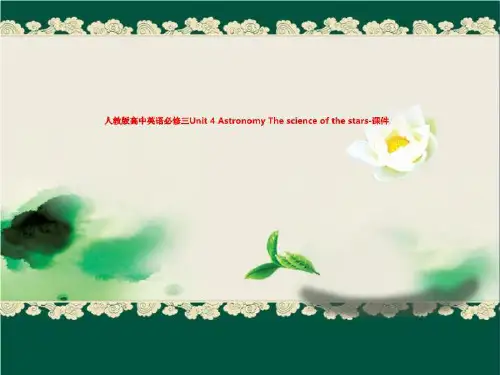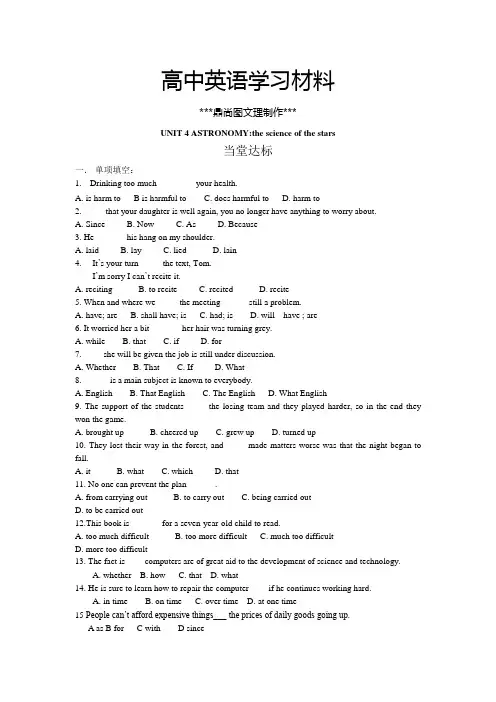人教版高中英语必修三Unit4Astronomy带听力.docx
- 格式:docx
- 大小:39.82 KB
- 文档页数:11





高中英语学习材料***鼎尚图文理制作***UNIT 4 ASTRONOMY:the science of the stars当堂达标一.单项填空:1.Drinking too much ________ your health.A. is harm to B is harmful to C. does harmful to D. harm to2. _____that your daughter is well again, you no longer have anything to worry about.A. SinceB. NowC. AsD. Because3. He _______his hang on my shoulder.A. laidB. layC. liedD. lain4. ---It’s your turn _____the text, Tom.---I’m sorry I can’t recite it.A. recitingB. to reciteC. recitedD. recite5. When and where we _____the meeting ______still a problem.A. have; areB. shall have; isC. had; isD. will have ; are6. It worried her a bit _______her hair was turning grey.A. whileB. thatC. ifD. for7._____she will be given the job is still under discussion.A. WhetherB. ThatC. IfD. What8. ______is a main subject is known to everybody.A. EnglishB. That EnglishC. The EnglishD. What English9. The support of the students_____ the losing team and they played harder, so in the end they won the game.A. brought upB. cheered upC. grew upD. turned up10. They lost their way in the forest, and _____made matters worse was that the night began to fall.A. itB. whatC. whichD. that11. No one can prevent the plan ______.A. from carrying outB. to carry outC. being carried outD. to be carried out12.This book is _______for a seven-year-old child to read.A. too much difficultB. too more difficultC. much too difficultD. more too difficult13. The fact is ____computers are of great aid to the development of science and technology.A. whetherB. howC. thatD. what14. He is sure to learn how to repair the computer____ if he continues working hard.A. in timeB. on timeC. over timeD. at one time15 People can’t afford expensive things___ the prices of daily goods going up.A asB forC withD since16. It is reported that the united states uses____ energy as the whole of Europe.A as twice B. twice much C. twice much as D. twice as much17.----How long are you staying? ----I don’t know _____A That’sB Never mindC It dependsD It doesn’t matter18The camera isn’t missing. It’s still____ where I ____ it a month ago.A lies; layB lies; laidC lays; layD lays; laid19. That’s the best way you thought of ____into dangerous areas.A stopping people to getB to stop people gettingC keeping people gettingD preventing people to get20.Just because of his own carelessness, he was made to do it ____time.A the secondB a secondC secondD a twice参考答案语法1.What,2.that3.that4.who5.what6.that7.that8.what,that。




Unit 4 Astronomy: the science of the stars单元测试题(满分120)第一部分:听力(满分30 分)。
做题时,先将答案划在试卷上。
录音结束后,你有两分钟的时间将答案转涂到答题卡上。
第一节(共5小题;每小题1.5分,满分7.5分)听下面5段对话,每段对话后有一个小题,从题中所给的A、B, C三个选项中选出最佳选项,并标在试卷的相应位置听完每段对话后,你都有l0秒钟的时间来回答有关小题和阅读下一小题。
每段对话仅读一遍。
1.What can we learn from the dialogue?A.The final score was zero-four.B.England team lost the football match.C. The man felt disappointed.2.Where is this conversation probably taking place?A.On the bus. B.At the library.C. At the cinema.3.What drink does the woman prefer?A.Coffee.B.Cold water. C. Tea.4.What’s the mall interested in during his free time?A.Playing chess. B. Collecting stamps. C. Nothing but play.5.What do the two speakers do immediately?A.Have a cup of coffee.B.Take a taxi to the woman’s place.C.Make an early start.第二节(共15小题; 每小题1.5分,满分22. 5分)听下面5段对话或独自。
每段对话或独自后有几个小题,从每题所给的A、B、C三个选项中选出最佳选项,并标在试卷的相应位置。
高中英语学习材料 ***鼎尚图文理制作*** Unit 4 Astronomy: the science of the stars 第一部分:听力(共两节,满分30分) 第一节(共5小题;每小题1.5分,满分7.5分) 请听下面5段对话,选出最佳选项。 1. What can we know about the woman? A. She had to work overtime. B. She failed to see Henry. C. She had a traffic accident. 2. What does the man mean? A. He wonders why the woman is here. B. He himself is Dr Johnson. C. The doctor will be here soon. 3. What is the man? A. A reporter. B. A patient. C. A scientist. 4. Where does the conversation take place? A. At a restaurant. B. In a classroom. C. In a shop. 5. How will the two speakers go to London? A. By car. B. By air. C. By train. 第二节(共15小题; 每小题1.5分,满分22.5分) 请听下面5段对话或独白,选出最佳选项。 请听第6段材料,回答第6、7题。 6. Why are Mondays terrible for the man? A. He doesn’t want to work after the weekend. B. Monday is full of difficult lessons for him. C. Monday means the beginning of a whole week. 7. What subjects does the man seem to like? A. Art and Music. B. English and Maths. C. Geography and Maths. 请听第7段材料,回答第8至10题。 8. Where does the conversation take place? A. At a restaurant. B. In a hotel. C. At home. 9. What time does the dining-room close? A. At 8:30 am. B. At 9:30 am. C. At 10:30 am. 10. What will the man do? A. Make a call to Room Service. B. Go to a restaurant. C. Go out and buy something to eat. 请听第8段材料,回答第11至14题。 11. Who is Frank Stone? A. A friend of the woman’s. B. A visitor to the clinic. C. A patient of Dr Milton’s. 12. Why won’t Mr Stone come to the clinic tomorrow? A. The clinic will be closed. B. Dr Milton won’t come to work. C. He can’t spare the time. 13. When is the clinic open in a week? A. During the whole week. B. On weekdays except Thursday. C. From Monday to Friday. 14. When will Mr Stone see Dr Milton? A. 6:15 pm on Wednesday. B. 6:15 pm on Thursday. C. 5:30 pm on Wednesday. 请听第9段材料,回答第15至17题。 15. What’s the probable relationship between the two speakers? A. Schoolmates. B. Teacher and student. C. Strangers. 16. Why does Jeanie come to school earlier? A. To meet her friend. B. To have a class. C. To go over her lessons. 17. How is Jack feeling before the test? A. Calm. B. Worried. C. Excited. 请听第10段材料,回答第18至20题。 18. Where did the speaker go the other day? A. A football game. B. A bike race. C. A park. 19. What can we learn about the bird nest? A. It is very small. B. There is a lake in the middle of it. C. It is short. 20. What did the speaker do at the end of her visit? A. She watched a bird show. B. She played basketball. C. She talked with some birds. 第二部分:英语知识运用(共两节,满分45分) 第一节:单项填空(共15小题;每小题1分,满分15分) 从A、B、C、D四个选项中,选出可以填入空白处的最佳选项。 21. —Will you go swimming with me this weekend? —______. A. All depend B. It depends C. It depends on D. All depends on 22. I was about to knock on the door when it was opened ______. A. from in B. within C. in D. from within 23. The happy news quickly ______ through the whole village. A. was spread B. were spreading C. spread D. had been spread 24. We can’t continue to pretend that the problem of homelessness doesn’t ______ in this city. A. exist B. live C. be D. survive 25. The hall was already full, and hundreds of ______ fans were turned away at the door. A. disappointing B. disappointed C. disappoint D. disappointment 26. The club women gathered ______ clothes for people in the tsunami-hit countries. A. a mass of B. mass of C. a large amount of D. amount of 27. We should try our best to ______ those people after the disaster. A. break out B. cheer on C. break up D. cheer up 28. At last, I made up my mind to speak the truth ______of the whole class. A. in the present B. at the present C. in the presence D. at the presence 29. He wants to see changes in the company and I am sure he will, ______. A. on time B. at a time C. at one time D. in time 30. They had a ______ quarrel and John stormed out. A. violent B. cruel C. strong C. harmful 31. The government has to close those small factories to prevent the water of the river ______. A. polluting B. from polluting C. being polluted D. polluted 32. ______ I’m well again, I can go on with my work. A. Even if B. As though C. Ever after D. Now that 33. Some of the doctors are paid almost ______ as the nurses.